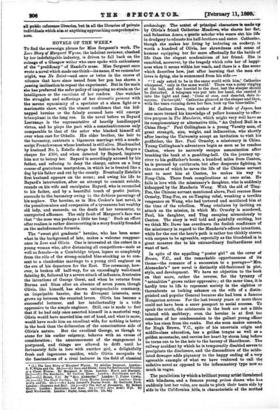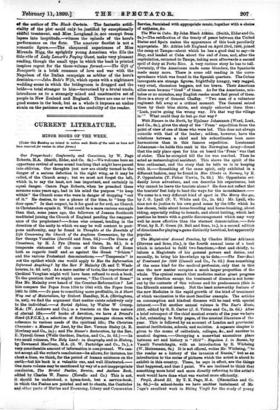NOVELS OF THE WEEK.*
To find the sovereign phrase for Miss Sergeant's work, The Love Story of Margaret Wynne, the indolent reviewer, abashed by her indefatigable industry, is driven to fall back on the coinage of a Glasgow writer who once spoke with enthusiasm of the "prolificacy" of Handel's muse. Miss Sergeant once wrote a novel which made one think—its name, if we remember 'right, was No Saint—and once or twice in the scores of rolumes that have since issued from her pen has shown a ?assing inclination to repeat the experiment. But in the main she has preferred the safer policy of imposing no strain on the intelligence or the emotions of her readers. One watches the struggles and sufferings of her dramatis persona with the serene equanimity of a spectator at a sham fight or a marionette show, with the utmost confidence that the kid-
napped heroine or the falsely accused hero will emerge triumphant in the long run. In the novel before us Bayard Lestrange is the representative of heavily handicapped virtue, and he plays the part with a conscientiousness only comparable to that of the actor who blacked himself all over when cast for Othello. His elder brother, the heir to the baronetcy, contracts a bigamous marriage with a nonde- script Frenchwoman whose husband is still alive. Blackmailed by husband No. 1, Estelle drugs her father-in-law, forges a cheque for £300, and when detected by Bayard, implores him not to betray her. Bayard is accordingly accused by his father, and refusing to deny the charge, enters on a long course-of gratuitous martyrdom, in which he is treated like a dog by his father and cut by the county. Eventually Estelle's first husband appears on the scene; and owing his life to Bayard's intervention, after an attempt to commit suicide, rounds on his wife and exculpates Bayard, who is reconciled to his father, and by a beautiful touch of poetic justice, succeeds to the baronetcy owing to the dubious parentage of his nephew. The heroine, as in Mrs. Croker's last novel, is the penniless niece and companion of a tyrannous but wealthy old lady, and succeeds, on the death of her tormentor, to unexpected affluence. The only fault of Margaret's face was that " the nose was perhaps a little too long." Such an effort after realism is rather disconcerting in a story frankly founded on the melodramatic formula.
The "sweet girl graduate" heroine, who has been some- what in the background of late, makes a welcome reappear- ance in Love and Olivia. One is interested at the outset in a young woman who, after distancing all competitors—male as well as female—in a Cambridge tripos, lapses so completely from the role of the strong-minded blue-stocking as to con- sent to a clandestine marriage to a young civil engineer on the eve of his departure for the East. The ceremony, how- ever, is broken off half-way, for an exceedingly well-timed fainting fit, followed by a severe attack of influenza, frustrates the intentions of George Gorst, and when he returns from Burma and Siam after an absence of seven years, though Olivia, like himself, has shown unimpeachable constancy, an impalpable barrier, due to divergent interests, soon grows up between the reunited lovers. Olivia has become a successful lecturer, and her intellectuality is a trifle oppressive to the simple engineer. Still, one is made to feel that if he had only once asserted himself in a masterful way, Olivia would have married him out of hand, and what is more, would have made him an excellent wife, for nothing is better in the book than the delineation of the conscientious side of Olivia's nature. Bat the excellent George, as though to atone for his earlier exigency, behaves with an excess of consideration ; the announcement of the engagement is postponed, and things are allowed to drift until he fortunately falls in love with another girl, a delightfully fresh and ingenuous maiden, while Olivia succumbs to the fascinations of a rival lecturer in the field of classical • (1.) The Love Story of Margaret Wynne. By Adeline Sergeant. London: P. V. White and Co. [6e.]—(2.) Love and Olivia: being the Sentimental Troubles of a Clever Woman. By Margaret B. Cross. London : Hurst and Blackett. 1—(3.) The Mandarin. By Carlton Dawe. London Hutchinson and Co. 10.]—(L) Brown, V.C. By "Mrs. Alexander." London: T. Fisher Unwin. 09.1—(5.) The Buick Curtain. By Flora Eames Lougheud. London : Duck- worth and Co. [69.1—(6.) Lady Lanark's Paying Guest. By Gertrude Ford. London: Chapman and Hall. [6s.)—(7.) The Oft of Bonaparte. By Robert Shortz. London: Rontledgo and Sons. Ns )—(8.) John Bedis Wife. By Cecil Wentworth. London : Digby, Long, and Co. Ps. KJ
archaeology. The sextet of principal characters is made up by Olivia's friend Catherine Meadows, who shares her fiat, and Sebastian Ames, a gentle scholar who wears out his life in drudgery to educate his half-brothers and sister. Catherine, though she makes her living by lecturing on cookery, is worth a hundred of Olivia, her shrewdness and sense of humour equipping her far more effectually for the battle of life than the elegant academicism of her friend. She is ennobled, moreover, by the tragedy which robs her of happi- ness when it seems within her reach, and there is a fine scene which describes how, just after learning that the man she loves is dying, she is summoned from his side :—
"4 I only asked to be in the same world with him,' Catherine whispered, ' only in the same world.' There was a noisy ringing at the bell, and she hurried to the door, lest the sleeper should be disturbed. A telegram was put into her hand, she carried it into the light and read: 'Come at once, cook deserted, duke to- morrow. Cartwright.' Catherine glanced at the sleeper and then, with the tears running down her face, took up the time-table."
Mr. Carlton Dawe, the author of A Bride of Japan, has once more turned his knowledge of yellow humanity to effec- tive purpose in The Mandarin, which might very well have as its complementary or alternative title, " An Oxford Bull in a China Shop." Paul Collingham is a young 'Varsity man, of great strength, size, weight, and indiscretion, who shortly after leaving the University accept an invitation to visit his godfather, the Rev. Paul Ormsby, a missionary in China. Young Collingham's adventures begin as soon as he reaches Canton, where he narrowly escapes assassination after breaking the bank at a gambling-hell. On the journey up- river to his godfather's house, a hundred miles from Canton, he is pursued by cutthroats, but after desperate fighting, in the course of which he saves the life of the Chinese servant sent to meet him at Canton, he makes his way to Fong-Chin. There fresh complications at once arise. He falls in love with the missionary's daughter, who is suddenly kidnapped by the Mandarin Wang. With the aid of Ting- Poo, the Chinese servant mentioned above, Paul rescues Rose Ormsby, Ting-Foo, an ex-Taeping rebel, wreaking a terrible vengeance on Wang, who had tortured and mutilated him at the time of the rebellion. Wang retaliates by inciting an attack on the mission, in which Mr. Ormsby is murdered, Paul, his daughter, and Ting escaping miraculously to Canton. The story is well told and painfully exciting, but we think Mr. Dawe has overdrawn the foolish confidence of the missionary in regard to the Mandarin's odious intentions, while for the rest the hero's path is rather too thickly strewn with corpses to be agreeable, especially as the bloodshed is in great measure due to his extraordinary foolhardiness and want of tact.
In spite of the appalling "poster girl" on the cover of Brown, V.C., and the remarkable opportuneness of its theme—the romance of a succession to a peerage—" Mrs. Alexander's" new novel is distinctly old-fashioned in plot, style, and development. We have no objection to the book on that score, rather the reverse, for the tyranny of "actualities " grows rather oppressive ; at the same time, it is hardly true to life to represent society in the eighties or thereabouts as looking askance on the wife of a distin- guished and popular General because she had been a famous Hungarian actress. For the last twenty years or more there could not have been a surer passport to social success. To speak the troth, the aristocrats in the book are not a little tainted with snobbery; even the heroine is at first too conscious of her condescension to the gallant young officer who has risen from the ranks. But she soon makes amends, for Hugh Brown, V.C., spite of his uncertain origin and middle-class education, has a golden tongue as well as a golden moustache, and carries her heart by storm long before he turns out to be the heir to the barony of Hazelhurst. The railway accident by which he is temporarily disabled serves to precipitate the disclosure, and the discomfiture of the acidu- lated dowager adds piquancy to the happy ending of a very agreeable example of what we have ventured to call the sedative novel as opposed to the inflammatory type now so much in vogue.
The parallelism by which a brilliant young artist threatened with blindness, and a famous young prima donna who has suddenly lost her voice, are made to pitch their tents side by side in the Californian hills, is characteristic of the method of the author of The Black Curtain. The fantastic artifi- ciality of the plot could only be justified by exceptionally skilful treatment, and Miss Loughead is not exempt from lapses into ineptitude,—witness the episode of the hero's performance on the flute. The amateur flautist is not a romantic figure.—The chequered experiences of Miss Miranda Higg, the sprightly young American who fills the title-role of Lady Lanark's Paying Guest, make very pleasant reading, though the small type in which the book is printed inspires regret for the three-volume format.—The Gift of Bonaparte is a brisk romance of love and war with the Napoleon of the Italian campaign as arbiter of the hero's destinies.—.Tohn Bede's Wife, which opens with a nightmare wedding scene in which the bridegroom is drugged and the bride—a total stranger to him—terrorised by a brutal uncle, introduces us to a strangely mixed and unattractive set of people in New Zealand and England. There are one or two good scenes in the book, but as a whole it imposes an undue strain on the patience as well as the credulity of the reader.







































 Previous page
Previous page